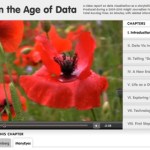Journalism
For everyone frustrated with the unscientific, spotty, incoherent and often inaccurate coverage of the Japanese nuclear plant situation: one geo-blogger and her dad try to help out. Now THAT is how you use your scientific expertise to improve public understanding in a meaningful, immediate way. Bravo, georneys!
I've been sticking to my "no Internet before writing something" quota fairly well the last several days, with a couple of exceptions: 1) writing or no writing, I read a bunch of RSS feeds on my phone when I'm putting SteelyKid to bed at night, and 2) I keep following events in the Middle East via Al Jazeera online, mostly their live blogging from Libya. It's fascinating to watch.
Of course, this blog also has an official Senior Middle East Correspondent, namely my friend Paul, who is a journalist based in Cairo. When the Egyptian revolution started, he was out of the country on a family…
Deservedly or not, jocks have a reputation for being less cerebral than beaker jockeys and bookworms. But when it comes to American football, brain damage can be all in a day's work. On The Pump Handle, Liz Borkowski highlights a recent article by Ben McGrath in the New Yorker, addressing "the effects of repeated brain trauma, which football players often experience during games and practice alike." Even if a player walks off the field, repeated brain-rattlings can lead to dementia and other long-term health problems. But thanks to journalists like Ben, the NFL is starting to pay…
The Kaiser Family Foundation has just released a report on the future of global health journalism, and it's not surprising to hear that the traditional model of covering global health is crumbling. KFF commissioned journalists Nellie Bristol and John Donnelly to conduct this research, and their interviews with 51 stakeholders found that challenges abound. Budget pressures on mainstream news media have reduced the number of reporters on this beat and restrained their ability to travel. Freelancers struggle to find receptive outlets for their stories and stretch paltry story payments to cover…
Ben McGrath has an excellent article on "the NFL and the concussion crisis" in the January 31st issue of the New Yorker. It's well worth a read (though it might change the way you see the Superbowl), but the thing I want to highlight is the roles of Alan Schwarz and the New York Times in raising the public's awareness of a problem that pervades football. (For our international readers, I'm referring to the US version of football - I realize that word means something different in the rest of the world.)
Specifically, the problem is the effects of repeated brain trauma, which football players…
the Wall Street Journal, of all places, has a profile of college basketball analyst Bill Raftery and how he prepares to call games. This would be nothing more than Links Dump material, save for the fact that bits of it appear to have been written for the benefit of visiting aliens who have never seen televised basketball before:
Over the years, the exercise evolved into the intricate system he uses today. On the far left side of the page, Mr. Raftery writes down each player's name and number. Next are the player's habits and tendencies, as few as three or as many as seven. This season's…
I'm honored to get a brief shout-out today from the awesome Ed Yong in his post on female bloggers. I mention this not to toot my own horn, but to call attention to the amazing number of women blogging about scientific research - something I rarely do anymore at BioE, but which is very important to public science literacy, science policy, and inspiring young women to choose careers in science.
Many of the women Ed mentions are already on my blogroll (Sheril Kirshenbaum, Jennifer Ouellette, Scicurious, Janet Stemwedel, to name a few), but I clearly have to add more - including my friend…
So I'm all in favor of promoting struggling artists, and that includes documentary filmmakers. But I have to say I'm a little taken aback by the aesthetic of the "Synthetic Bio" documentary project by Field Test Films (and endorsed by Carl Zimmer). They've posted a short over at Kickstarter, where they're trying to raise $30K to finish the film in time for Sundance. But as one of my biologist friends pointed out, the soundtrack they use for the sample short (on producing spider silk in goat's milk) is eerie, mad-scientist stuff, complete with a Exorcist-like choir at the end.
I'm posting the…
Sometimes, that is what I think news reporters do. There are occasions when you know the story and have the opportunity to watch them spew out incorrect information. Sometimes you do not know the story but you can watch them getting it wrong and see that happening while they appear to remain oblivious to their own clumsy ineptitude.
Several years ago Minnesotans watched in horror as the bodies of a dozen kids where pulled out of a cave where they had suffocated, a cave in a Mississippi River bluff in Saint Paul. Or was it six kids? Or was it a mine and not a cave? Or was it eight kids?…
Here are some essay links I've had open as tabs in my browser for over a week, waiting to be posted. Unfortunately, I don't have time to do the extensive commentary they deserve, so I'm admitting that, and just posting them already. Enjoy.
Graphical Abstracts & Biologists as Designers
Andrew Sun discusses "graphical abstracts" at nature network:
Although they are irrelevant to the quality of the research in my opinion, graphical abstracts (GAs) are in fact increasingly appreciated nowadays. No matter you like them or not, chances are that you have to draw one in order to publish your…
I'm very pleased to announce that the Uncertain Principles Person of the Year for 2010 is... SteelyKid:
Why do I say this? Well...
First, as lots of people will tell you, we're all citizen journalists now. Which means that I'm every bit as entitled to declare a person of the year as Time magazine is.
Second, everything in Chateau Steelypips revolves around her, so she is clearly the most important and influential person here.
Third, she's way cuter than Mark Zuckerberg. Granted, I don't have a picture of Mark Zuckerberg wearing a napkin as a hat for direct comparison, but I like my odds on…
Many months ago, the fossil primate "Ida" was reported to the world with much fanfare, including an entire mass market book and a huge press conference, and everything else one can possibly do to announce a new fossil find. Science bloggers and others got rather upset at the Ida team's over the top fanfare, though few bloggers ever explained why it was a bad thing to make everyone on the planet notice an important new scientific find (and no one made the claim that Ida was not very important). One of the things the Ida team did was to use the term "missing link" in connection with that…
The poor coverage of science in the media is an evergreen topic in blogdom, to the point where I've mostly stopped clicking on links to those sorts of pieces. This ScienceProgress post about newsroom culture bugged me, though, and it took me a while to figure out the problem. The author worked as a reporter in North Carolina over the summer, covering science topics, and writes about his dissatisfaction with the journalistic template:
I had one editor who required that I give him my story pitches using six words or fewer. But the message wasn't even simply to shorten; it was to make it punchy…
The New York Times decided earlier this week that biological animation warrants its own article. About time! :)
Seriously, for those of you who haven't discovered BioVisions' amazing animations, you should check them out and/or use them in class - with the caveat that they're not "pure" data:
While acknowledging the potential to help refine a hypothesis, for example, some scientists say that visualizations can quickly veer into fiction. "Some animations are clearly more Hollywood than useful display," says Peter Walter, a Howard Hughes Medical Institute investigator at the University of…
Knight Fellow Geoff McGhee created this polished video documentary series about how data visualization is infiltrating and transforming journalism. Interviews with Many Eyes creators Fernanda Viegas and Martin Wattenberg, Amanda Cox of the New York Times, and other dataviz luminaries are coupled with bios and links to further information, some history of visualization techniques, industry context (is dataviz profitable? who's doing it?) and lots of lovely examples. The last section of the video, "First Steps," is a mini-tour of useful DIY sites like Swivel and Wordle (which is ridiculously…
In September Wired UK published my feature on the health risks of nanotechnology. The article is now online.
Nanotechnology's commercial growth has been accompanied by fears that it could damage human health and the environment. This in turn is stoking pressure on government and regulators to limit -- even ban -- a technology whose promise includes cleaner fuels, improved water filtration, better medicines, faster electronics and healthier foods.
The New York Times has an article about the opening of a teacher-run school in The City. It sounds like an interesting experiment:
Shortly after landing at Malcolm X Shabazz High School as a Teach for America recruit, Dominique D. Lee grew disgusted with a system that produced ninth graders who could not name the seven continents or the governor of their state. He started wondering: What if I were in charge?
Three years later, Mr. Lee, at just 25, is getting a chance to find out. Today, Mr. Lee and five other teachers -- all veterans of Teach for America, a corps of college graduates who…
I think its pretty obvious to even the most casual observer of this blog, I am not a professional writer. I am a scientist-in-training who is madly in love with viruses, and wants the general public to understand how cool viruses are too, so I write this blag.
While I have been coaxed into writing a for realsies science article before, that was a laborious process for me and the editors, cause me no rites gud. I can write like a scientist, or write like an lolcat. Not 100% useful for an article aimed at mainstream audiences.
So its with some surprise that I am now writing a blog post…
A lot of Twitter energy was soaked up Friday afternoon by a half stupid article by Virginia Heffernan at the New York Times. Sparked by Sodamageddon, she takes a look at ScienceBlogs for the first time, and doesn't like what she sees:
Hammering away at an ideology, substituting stridency for contemplation, pummeling its enemies in absentia: ScienceBlogs has become Fox News for the religion-baiting, peak-oil crowd. Though Myers and other science bloggers boast that they can be jerky in the service of anti-charlatanism, that's not what's bothersome about them. What's bothersome is that the site…


